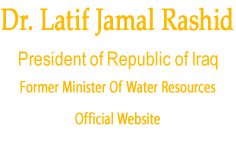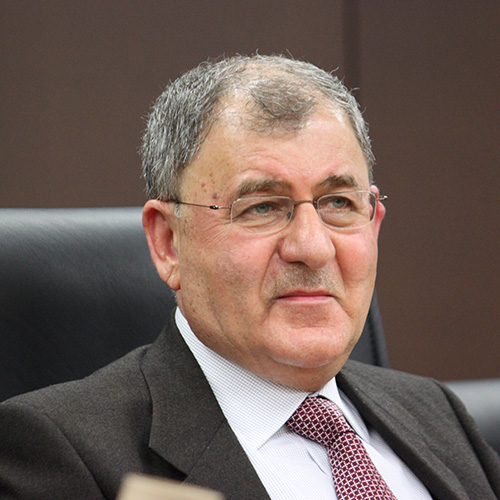Speech of H.E. Dr. Latif Rashid
Senior Adviser to the President of Iraq
Former Minister of Water Resources
Iraqi Investment and Trade Conference London
3-4 July 2017
Ladies and Gentlemen:
Thank you for inviting me to this conference. This conference comes at a critical time and discusses a subject that is important to both Iraq and the UK. Iraq needs investment from developed countries that have the expertise, capability and history if I may add, the UK which is undergoing the Brexit, is looking for promising new opportunities and partners and Iraq is a perfect match.
Iraq is a very rich country when it comes to natural resources. It has tremendous potential and needs almost everything: from infrastructure, to housing complexes, shopping malls, hospitals, etc, you name it.
Therefore, very simply, there is a unique opportunity where there is a need and resources to cover the expenses of these needs.
On the other hand, Iraq suffers from extreme poverty, bad management, endemic corruption, weak state institutions, political bickering, lawlessness, lack of services, squandering of natural resources, lack of security and public protection, etc.
Unfortunately, Iraqi richness has not been translated to tangible results. Iraqis have not reaped the benefits of their wealth. Most of Iraq’s problems are manmade. Therefore, there are steps that are critical for the future of Iraq. Critical at this stage as Iraq is preparing for the defeat of Daesh. I would like to congratulate our fighting forces and ourselves for liberating Mosul and other areas.
Further more serious steps should be taken to resolve political and economic situation with Kurdistan regional government, especially Kurdistan political and financial problems.
On the political level:
Reforming political institutions to increase transparency and accountability. Iraq is holding, so far, regular elections on the local and national levels. However, Iraq has not completed its transition to democracy and cannot under the current system consolidate gains toward prosperity and better life.
In Iraq, the electorate does not know who represents them and they cannot reward or punish their representatives. They also do not have clear channels to voice their grievances.
The Iraqi electoral system needs to be redesigned to establish direct relations between the voter and the representative. That would increase the accountability and transparency of the system and would help in moving Iraqi politics towards substantive politics. Through the present political and party system leaderships in full authority and control without accountability. It is important to reduce the authorities of political leaderships.
On the Economic Level:
Iraq has major structural economic issues: the public sector dominates the economy and is primarily dependent on oil which constitutes provides for more than 90% of the government’s revenues and more than 80% of its foreign exchange earnings.
Iraq’s economy needs to be diversified. To do so the private sector in Iraq must play a greater role. Relevant to the subject of this conference, investment is the key to bolster such engagement in the private sector.
There are two very lucrative sectors that are in bad need of investment: services and tourism. In Iraq banking is an area that needs foreign investment, oil industry, oil refining, petrochemicals, etc. Simply the areas in which Iraq can compete without protection and support from the government or support for a limited period. Also, Iraq needs to privatize its public enterprises and it would be easier to do so if there is interest from foreign companies to invest in these enterprises.
Further, private Small and Medium Enterprises (SME) must be encouraged and supported to increase their contribution to the Iraqi economy. This will reduce total dependence on oil in the state budget.
On the Administrative Level:
One of the challenges that Iraq is facing is the running cost of the bureaucracy. As stated above the economy is dominated by the state and the state employs the majority of the workforce. The cost is unbearable and the situation is un-sustainable.
There are millions of people employed by the state. There are legal challenges and political impediments to address this issue. First how can one layoff a public servant. There are laws and procedures to do so and the millions of employees are protected by these laws and procedures. Second to cut down the number of employees amounts to political suicide for any politician since these employees and their families will turn against him/her.
What makes the situation even worse is the millions that are employed by the state are not hired based on their merits and qualifications but due to their kinship and political affiliation. Iraq suffers from a chronic case of favoritism and nepotism. This means that the bureaucracy that is consuming the resources of the state is an ineffective bureaucracy staffed by incompetent people who are unable to carry out the tasks and duties entrusted to them.
One of the most urgent reforms that needs to be undertaken and that are politically feasible is to establish the Federal Public Service Council as stipulated in the constitution.
Iraq also needs to decentralize its decision-making process and delegate power from the center to the federal government to the regional and provincial governments.
Last but not least - Iraq needs Digital Transformation:
Digital transformation
Iraq must materialize digital transformation and build the infrastructure, systems, and operating programs and the use of the expertise of information scientists in major global companies.
It needs to focus on technology especially in the field of security and administration to minimize the effects of sectarian, national, tribal intolerance, corruption and incompetence and to raise the performance of the government. It is necessary to complete and activate the work of e-government.
This can be one of the most important and most consequential areas of cooperation between the UK and Iraq. One of the most important reasons why the state bureaucracy is ineffective and the state intuitions are weak is the incompetent staff the educational system is producing. This educational system having a very negative effect on both private and public sectors.
I know the challenges are interwoven and present kind of a causality dilemma whether the chicken is from the egg or vice versa: do we perform the administrative reforms or economic reforms first. The answer is we do them in parallel and one of the most important needs is investment: foreign investment that is mutually beneficial to both Iraq and the investors. This needs a serious and realistic program with a road map to be implemented.
Having said that it is a right time for investment in Iraq and with all the outlined issues Iraq has shown number of achievements such in field of telecommunication and internet...Etc.
Thank you,
Further Readings:
1 Country Analysis Brief: Iraq, US Department of Energy
And: (2015). "Iraq facts and figures." Retrieved June 14, 2017, from http://www.opec.org/opec_web/en/about_us/164.htm.
And: (2017, April 28, 2016). "Iraq's Key Energy Statistics ". Retrieved May 28, 2017, from https://www.eia.gov/beta/international/country.cfm?iso=IRQ.
And: (2017). "INTERNATIONAL ENERGY STATISTICS : Vented and Flared Natural Gas, 2014."
Retrieved May 28, 2017 from https://www.eia.gov/beta/international/rankings/#?prodact=43-
1&iso=IRQ&pid=43&aid=1&tl_id=1-A&tl_type=a&cy=2014.
And: (2017, June 15, 2017). "The World Fact Book: Iraq." Retrieved May 22, 2017, from https://www.cia.gov/library/publications/the-world-factbook/geos/iz.html.
Iraq’s crude oil reserves are estimated to be more than 143 billion barrels, which is OPEC’s second largest and the world’s fifth largest reserves. Iraq holds 9% of proven global oil reserves. Better yet, Iraq’s known hydrocarbon wealth is still unexploited. Output of refined petroleum products is about four and a half million barrels per day, while it exports more than three million barrels per day. Proven natural gas reserves are estimated to be 3.158 trillion cubic meters, and is the 11th or 12th (depending on the source) largest reserves in the world. However, Iraq does not export any of the natural gas it produces. Iraq flares or vents most of the natural gas it produces. In 2014 Iraq vented and flared 455 billion cubic feet of natural gas and was the second largest flaring country of gas worldwide, squandering billions of dollars, although there are steps that are taken now by the government to reduce flaring. Iraq is also rich in phosphate and Sulphur, and has a very long history and has agricultural potential. Iraq is also rich in phosphate and Sulphur, and has a very long history and has agricultural potential.
2 (2017). "Sustainable Development Goals: About Iraq." Retrieved May 15, 2017, from http://www.iq.undp.org/content/iraq/en/home/countryinfo.html.
3 Patrick, S. E. R. S. (2008). Index of State Weakness in the Developing World, The Brookings Institution.
10, 14, 15, 17,
4 (2017). "Iraq." Retrieved June 1, 2017, from http://www.worldbank.org/en/country/iraq.
And: (2017, June 15, 2017). "The World Fact Book: Iraq." Retrieved May 22, 2017, from https://www.cia.gov/library/publications/the-world-factbook/geos/iz.html.
And: (2017). "INTERNATIONAL ENERGY STATISTICS : Vented and Flared Natural Gas, 2014." Retrieved May 28, 2017 from https://www.eia.gov/beta/international/rankings/#?prodact=43-
1&iso=IRQ&pid=43&aid=1&tl_id=1-A&tl_type=a&cy=2014.
And: (2017, April 28, 2016). "Iraq's Key Energy Statistics ". Retrieved May 28, 2017, from https://www.eia.gov/beta/international/country.cfm?iso=IRQ.
And: Country Analysis Brief: Iraq, US Department of Energy
Iraq’s GDP is 180.1 billion dollars, its GDP per capita was estimated to be 16500 USD in 2016. Iraq’s comparison in terms of GDP is 36 while in terms of GDP per capita is 101. 23% of Iraqis live under extreme poverty. Further, proven natural gas reserves are estimated to be 3.158 trillion cubic meters, and is the 11th or 12th (depending on the source) largest reserves in the world. However, Iraq does not export any of the natural gas it produces. Iraq flares or vents most of the natural gas it produces. In 2014 Iraq vented and
flared 455 billion cubic feet of natural gas and was the second largest flaring country of gas worldwide, squandering billions of dollars, although there are steps that are taken now by the government to reduce flaring.
5 (2009). Iraq:- The Way Forward A Political Strategy To Win & End the War In Iraq. The Faculty of the Josef Korbel School of International Studies. University of Denver, University of Denver. Master of Arts in International Studies: 125.
6 Ibid.
7 Ibid.
8 (2017). "Sustainable Development Goals: About Iraq." Retrieved May 15, 2017, from http://www.iq.undp.org/content/iraq/en/home/countryinfo.html.
9 (2017, June 15, 2017). "The World Fact Book: Iraq." Retrieved May 22, 2017, from https://www.cia.gov/library/publications/the-world-factbook/geos/iz.html.
10 Ibid.
11 (2005). The Iraqi Constitution (Unofficial Translation).
Article 107: A council named the Federal Public Service Council shall be established and shall regulate the affairs of the federal public service, including appointments and promotions, and its formation and competencies shall be regulated by law.
12 DeGross, B. K. D. P. T. D. W. A. T. W.-H. J. (2004). Information Systems Research: Relevant Theory and
Informed Practice, Springer Science & Business Media.
Digital transformation is the change associated with the application of digital technology in all aspects of human society.
Country Analysis Brief: Iraq, US Department of Energy
(2005). The Iraqi Constitution (Unofficial Translation).
(2009). Iraq:- The Way Forward A Political Strategy To Win & End the War In Iraq. The Faculty of the Josef Korbel School of International Studies. University of Denver, University of Denver. Master of Arts in International Studies: 125.
(2015). "Iraq facts and figures." Retrieved June 14, 2017, from http://www.opec.org/opec_web/en/about_us/164.htm.
(2017). "INTERNATIONAL ENERGY STATISTICS : Vented and Flared Natural Gas, 2014." Retrieved
May 28, 2017 from https://www.eia.gov/beta/international/rankings/#?prodact=43-
1&iso=IRQ&pid=43&aid=1&tl_id=1-A&tl_type=a&cy=2014.
(2017). "Iraq." Retrieved June 1, 2017, from http://www.worldbank.org/en/country/iraq.
(2017, April 28, 2016). "Iraq's Key Energy Statistics ". Retrieved May 28, 2017, from https://www.eia.gov/beta/international/country.cfm?iso=IRQ.
(2017). "Sustainable Development Goals: About Iraq." Retrieved May 15, 2017, from http://www.iq.undp.org/content/iraq/en/home/countryinfo.html.
(2017, June 15, 2017). "The World Fact Book: Iraq." Retrieved May 22, 2017, from https://www.cia.gov/library/publications/the-world-factbook/geos/iz.html.
DeGross, B. K. D. P. T. D. W. A. T. W.-H. J. (2004). Information Systems Research: Relevant
Theory and Informed Practice, Springer Science & Business Media.
Patrick, S. E. R. S. (2008). Index of State Weakness in the Developing World, The Brookings
Institution


